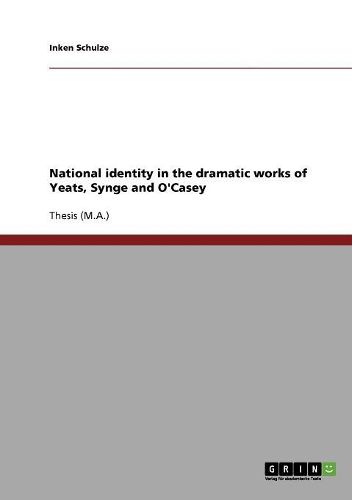Readings Newsletter
Become a Readings Member to make your shopping experience even easier.
Sign in or sign up for free!
You’re not far away from qualifying for FREE standard shipping within Australia
You’ve qualified for FREE standard shipping within Australia
The cart is loading…






Thesis (M.A.) from the year 2006 in the subject English Language and Literature Studies - Literature, grade: 1,85, Technical University of Braunschweig (Englisches Seminar/Abteilung fur Literatur- und Kulturwissenschaften der Terchnischen Universitat Braunschweig), 63 entries in the bibliography, language: English, abstract: There is no great literature without nationality, no great nationality without literature (John O'Leary) Although the high age of imperialism is thought to have started in the late 1870s, this does not hold true for English-speaking areas. Ireland, having been colonised by the English well over seven hundred years before, is an exception as England’s oldest colony. In the course of time, all native features of the Irish, above all their Celtic history, had to give way to the colonisers’ equivalents. It was not until the nineteenth century that the Irish developed a new national consciousness. It eventually enabled them to lay claim to their native history, religion and language as well as their national identity embodied in all of these aspects. In this respect, the Irish Literary Revival is particularly decisive since its writers dedicated themselves to a new way of dramatic expression. This thesis focuses on the three key writers of the literary movement William Butler Yeats (1865-1939), John Millington Synge (1871-1909) and Sean O'Casey (1880-1964). While concentrating on a revival of the Irish past, each spreading their own version of Irishness throughout the theatres, they helped Irish literature to become Irish, to become national again.
$9.00 standard shipping within Australia
FREE standard shipping within Australia for orders over $100.00
Express & International shipping calculated at checkout
Thesis (M.A.) from the year 2006 in the subject English Language and Literature Studies - Literature, grade: 1,85, Technical University of Braunschweig (Englisches Seminar/Abteilung fur Literatur- und Kulturwissenschaften der Terchnischen Universitat Braunschweig), 63 entries in the bibliography, language: English, abstract: There is no great literature without nationality, no great nationality without literature (John O'Leary) Although the high age of imperialism is thought to have started in the late 1870s, this does not hold true for English-speaking areas. Ireland, having been colonised by the English well over seven hundred years before, is an exception as England’s oldest colony. In the course of time, all native features of the Irish, above all their Celtic history, had to give way to the colonisers’ equivalents. It was not until the nineteenth century that the Irish developed a new national consciousness. It eventually enabled them to lay claim to their native history, religion and language as well as their national identity embodied in all of these aspects. In this respect, the Irish Literary Revival is particularly decisive since its writers dedicated themselves to a new way of dramatic expression. This thesis focuses on the three key writers of the literary movement William Butler Yeats (1865-1939), John Millington Synge (1871-1909) and Sean O'Casey (1880-1964). While concentrating on a revival of the Irish past, each spreading their own version of Irishness throughout the theatres, they helped Irish literature to become Irish, to become national again.